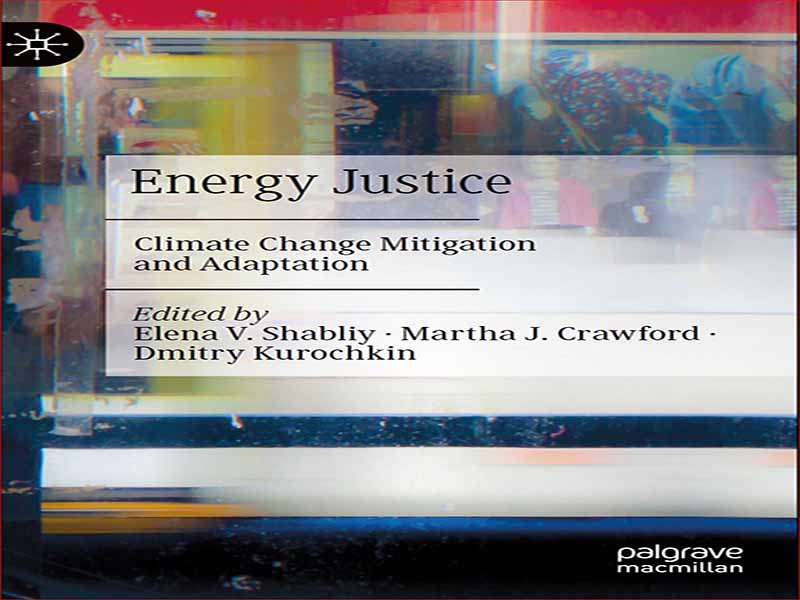- عنوان کتاب: Energy Justice / Climate Change Mitigation and Adaptation
- نویسنده: Elena V. Shabliy
- حوزه: تغییرات آب و هوا
- سال انتشار: 2022
- تعداد صفحه: 228
- زبان اصلی: انگلیسی
- نوع فایل: pdf
- حجم فایل: 7.33 مگابایت
من این را در ایده های مارس (15 مارس) 2020 می نویسم، زیرا ویروس کرونای جدید جهان را فرا گرفته است. هزاران نفر در حال حاضر جان خود را از دست داده اند، در برخی کشورها صدها نفر در یک روز، و در حالی که به نظر می رسد ویروس در ووهان، چین و بقیه آن کشور به اوج خود رسیده و عقب نشینی کرده است، اما به سرعت در مرکز جدید خود، اروپا و در اروپا نفوذ می کند. آمریکای شمالی نیز. این فقط مسئله زمان است که تمام جهان در این شعله بیماری گرفتار شود. از زمان همه گیری آنفولانزای 1918-1919، بیش از یک قرن پیش، هیچ چیز مشابهی وجود نداشته است. چرا این راه را در کتابی درباره عدالت انرژی، آب و هوا و پایداری شروع کنیم؟ واکنش مردم و دولت هایشان عمیقاً آموزنده است. در مواردی که اقدامات قاطع در اوایل انجام شده باشد، در جایی که آزمایش بیماری به راحتی در دسترس است و انجام می شود، جایی که فاصله گذاری اجتماعی معمول است، و در جایی که مردم تمام اقدامات احتیاطی را رعایت می کنند، در این صورت گسترش ویروس کند می شود، منحنی آن “مسطح” می شود و تعداد مرگ و میر کاهش یافته است. جایی که دولتها در ابتدای بحران تردید کردهاند – و تقریباً همه دولتها این کار را انجام دادهاند – جایی که آمادگی برای یک بیماری همهگیر، علیرغم هشدارها، برای چندین دهه به تعویق افتاده است، جایی که شهروندان با بیاحتیاطی یا سرسختانه به دستورالعملهای ماندن در خانه یا به حداقل رساندن تجمع توجه نمیکنند. در گروهها، و در جایی که افراد جوان تشخیص نمیدهند که چگونه خودشان، به میزان خفیف، میتوانند یک سرایت مرگبار را به شهروندان مسنتر و کسانی که دارای شرایط پزشکی زمینهای هستند، منتقل کنند، در آنجا ویرانیهای کووید-19 بیشتر است، سیستم مراقبتهای بهداشتی و بیمارستانها تحت تأثیر قرار میگیرند. . پزشکان و پرستاران خود به این بیماری تسلیم می شوند و بسیاری در نزدیکی بیماران خود می میرند. در این بحران، که به سختی چند ماه از عمرش می گذرد، به اندازه کافی سخت بوده است که بسیاری از افراد، از جمله صاحبان قدرت، با تخیل آگاهانه به آینده فکر کنند، حتی یک یا دو ماه، چه رسد به یک سال یا بیشتر. چیزی در روان انسان در برابر تغییر عادات، فکر کردن به یک روز بارانی، یا حتی تشخیص آن زمانی که می آید مقاومت می کند. این یک یادآوری تلخ است از اینکه شکست در تسریع یک انتقال بزرگ انرژی، و همچنین کاهش و انطباق آب و هوا، در نهایت باعث چه چیزی خواهد شد. اثرات مضر اعمال ناپایدار، سوزاندن مداوم سوختهای فسیلی، عادتهای بد انکار و اتلاف، کندتر ظاهر میشوند، و در کل این اثرات بهطور چشمگیری کمتر از ویرانیهای یک بیماری همهگیر به نظر میرسند. با این حال، حفظ انرژیهای تجدید ناپذیر و ادامه کشاورزی، قطع درختان و مصرف ناپایدار، منجر به آیندهای میشود که برخلاف همهگیری جهانی، در نهایت نمیتوان آن را معکوس کرد. اختلالات آب و هوایی به نقاط اوج غیرقابل برگشت خواهد رسید. یک جنگل بارانی یا جنگل بزرگ شمالی، زمانی که از بین برود، نمی تواند بهبود یابد. منجمد دائمی ذوب را نمی توان دوباره منجمد کرد. یک بیماری همه گیر به ندرت ثروتمندان را نجات می دهد، اما در یک دنیای ناپایدار، فقرا همیشه آسیب پذیرتر خواهند بود. بشریت و حیاتی که بشریت به آن وابسته است، تنوع زیستی باشکوه این سیاره کمیاب، شاهد فرسایشی خواهد بود که ما را به شکلی موذیانه و برای مدتی نامحسوس فقیر خواهد کرد. به دلیل تغییر سندرم خط پایه – که در آن ما دائماً دیدگاه خود را نسبت به آنچه طبیعی است تغییر می دهیم تا شرایط فعلی و غالب را تطبیق دهیم – خود را نه در یک شیب لغزنده، بلکه در حال سقوط بدون دستگیره در آن خواهیم دید. سؤال اصلی این است که آیا دولتها، شرکتها و خود شهروندان نیاز به انرژیهای تجدیدپذیر و شیوههای پایدار را به موقع تشخیص خواهند داد تا از تأثیرات مخرب و آبشاری روشی که تقریباً همه ما – بهویژه آنهایی که در جهان توسعهیافته – داشتهایم، جلوگیری کنند. زندگي كردن؟ دایره نامه پاپ سال 2015 این سوال را مطرح می کند. دیندار بودن یا نبودن، موضوع این نیست. (قوانین جهان طبیعی هیچ احترامی به دین یا معاملات مالی ندارند؛ طبیعت مشتقات را انجام نمی دهد.) همین سوال را رابرت جی لیفتون، که به تأسیس پزشکان بین المللی برای پیشگیری از جنگ هسته ای کمک کرد، پرسیده می شود. او نوشته است که مسائل پایداری، و بهویژه موضوع اساسی اختلال آب و هوا، از ما میخواهد که شیوه زندگی خود را تغییر دهیم، نه فقط در مصرف انرژی، غذا، زمین، درختان و آب، بلکه در خودآگاهی خود. خودمان به عنوان گونهای که حداقل برای یک نسل بر هر اکوسیستم روی زمین تسلط داشته است و همچنان خواهد بود. این مستلزم چیزی کمتر از استقرار مجدد ارزش های اساسی نیست. این سیاره اکنون باغ ما است و باغبانان نه تنها باید یاد بگیرند که چگونه از خاک و گیاهان تحت مراقبت خود مراقبت کنند، بلکه باید مراقب عادات خود باشند، کار خود را تنظیم کنند و به دیگرانی که مسئولیت دارند و حتی از خود گذشتگی توجه کنند. به باغ تکیه کن، نه تنها زندگان، بلکه کسانی که بعد از آن خواهند آمد. اگر نسل ما وارث دنیایی آشفته، فقیر و ناعادلانه باشد، نسل های آینده خواهند پرسید چرا؟ و بعد تذکر خواهند داد، لازم نبود اینطور باشد.
I write this on the Ides of March (March 15), 2020, as the novel coronavirus is sweeping the world. Many thousands have already died, in some countries hundreds in one day, and while the virus seems to have peaked and receded in Wuhan, China, and the rest of that nation, it is making swift inroads across its new epicenter, Europe, and in North America as well. It is only a matter of time before the entire globe is caught in this conflagration of disease. There has been nothing like it since the flu pandemic of 1918-1919, more than a century ago. Why start this way in a book about energy justice, climate, and sustainability? The reaction of people and their governments is deeply instructive. Where decisive action has been taken early on, where testing for the disease is readily available and practiced, where social distancing is the norm, and where people follow all precautions, then the spread of the virus is slowed, its curve “flattened,” and the number of deaths reduced. Where governments have hesitated at the beginning of the crisis—and almost every government has done so—where preparedness for an epidemic, despite warnings, has been delayed for decades, where citizens carelessly or stubbornly do not heed directives to stay home or to minimize gathering in groups, and where younger people fail to recognize how they themselves, mildly affected, can carry a mortal contagion to older citizens and to those with underlying medical conditions, there the ravages of Covid-19 are greatest, the health care system and hospitals overwhelmed. Doctors and nurses themselves succumb to the illness, many dying near their patients. In this crisis, barely a few months old, it has been hard enough to get many people, including those in authority, to think with informed imagination into the future eVen a month or two, let alone a year or more. Something in the human psyche resists changing habits, thinking of a rainy day, or eVen recognizing one when it comes. It is a grim reminder of what the failure to accelerate a great energy transition, as well as climate mitigation and adaptation, will eVentually cause. The harmful effects of unsustainable practices, of the continued burning of fossil fuels, of poor habits of denial and waste, will come more slowly, and on the whole these effects will appear far less dramatically noticeable than the raVages of a pandemic. HoweVer, holding on to non-renewable energy and continuing to pursue unsustainable farming, logging, and consuming, will result in a future that, unlike that of eVen a global pandemic, cannot be eventually reversed. Climate disruption will reach irreversible tipping points. A rainforest or great boreal forest, once decimated, cannot recover. Thawing permafrost cannot be refrozen. An epidemic rarely spares the rich, but in an unsustainable world the poor will always remain most vulnerable. Humanity and the life on which humanity depends, the glorious biodiversity of this rare planet, will see an erosion that will impoverish us in an insidious and, for a time, an imperceptible way. Because of the shifting baseline syndrome—in which we constantly alter our view of what is normal to accommodate whatever the current, prevailing conditions are—we shall find ourselves not on a slippery slope but already falling down it without a handhold. The major question then is, will governments, businesses, and citizens themselves recognize the need for renewable energy and sustainable practices in time to prevent the pernicious and cascading effects of the way that almost all of us—especially those in the developed world—have been living? The Papal Encyclical of 2015 asks this question. Whether one is religious or not is not the point. (The laws of the natural world are no respecters of religion, or of financial deals; nature doesn’t do derivatives.) The same question is asked by Robert Jay Lifton, who helped to found International Physicians for the Prevention of Nuclear War. He has written that issues of sustainability, and especially the foundational one of climate disruption, ask us to change the way that we live, not just in our consumption of energy, food, land, trees, and water, but in the very selfconsciousness of ourselves as the species that has, for at least a generation, dominated every ecosystem on Earth, and will continue to do so. This entails nothing less than a re-establishment of basic values. The planet is now our garden, and gardeners must not only learn how to tend the soil and plants under their care, they must watch their own habits, adjust their own work, and regard with responsibility, and even self-sacrifice, the others who rely on the garden, not only the living, but those who will come after. If our descendants inherit a chaotic, impoverished, and unjust world, future generations will ask, Why? And then they will remark, it did not need to be this way.
این کتاب را میتوانید از لینک زیر بصورت رایگان دانلود کنید:
Download: Energy Justice / Climate Change Mitigation and Adaptation



































نظرات کاربران